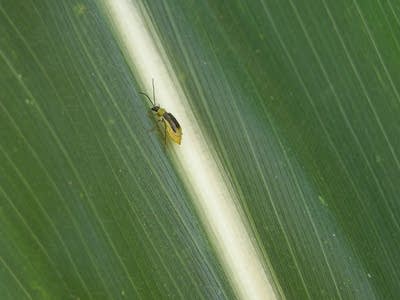Corn farmers struggle to cope with rootworm resistance

HILLS, Minn. -- The corn rootworm is called the billion-dollar pest, a rough estimate of how much money U.S. farmers spend annually to keep it at bay.
The best weapon they've ever had is a genetically modified corn plant containing a protein that kills the insect. But many bug experts are convinced that rootworms have developed a resistance to the protein, so that they can feast on the plant's roots and survive.
On top of a punishing drought, the leading corn pest is adding to crop damage in parts of Minnesota and elsewhere -- even though the plants are supposed to be immune from the bug, the corn rootworm beetle.
"We're not going to make this go away," said University of Minnesota professor Bruce Potter, a pest management specialist. "We're stuck with managing this problem."
Create a More Connected Minnesota
MPR News is your trusted resource for the news you need. With your support, MPR News brings accessible, courageous journalism and authentic conversation to everyone - free of paywalls and barriers. Your gift makes a difference.
U.S. Environmental Protection Agency officials looked at some problem fields in the Midwest last week and hope to hear some research results soon from Monsanto, which distributes genetically modified seeds.
There's no official confirmation of rootworm resistance, and Monsanto so far contends there is none. But Potter has seen what he calls a "ridiculous" increase in rootworms apparently unfazed by the usually deadly protein in southern and western Minnesota this summer.
Earlier this week he was at a workshop on a farm that has had resistant rootworm problems. The session drew about 100 farmers and agricultural consultants.
Potter told them the genetically modified corn is basically backfiring.
"Instead of making things easier, we've just made corn rootworm management harder and a heck of a lot more expensive," Potter said.
This year's drought in parts of the state added a new expense to the equation. In fields with a rootworm problem, the bug damages the cornstalk's ability to absorb water just when it's needed most. With the roots weakened, the plant can also be more vulnerable to wind.
Charlie Sandager, who hosted the workshop on his farm near the town of Hills in southwest Minnesota, said he learned last summer just how seriously rootworms can damage corn's ability to stand.
"Strong wind came up and it just tipped the corn plants over like a big old tree," Sandager said.
"I think the insects are going to win overall. They're bred to survive."
This year Sandager had to spend about $1,000 to have a cornfield sprayed with chemicals to kill a thriving rootworm population.
No one knows just how big a bite the pest is taking out of Minnesota's more than $7 billion corn crop this year -- or farmers' bottom lines.
But Sandager still has a sense of humor about the situation. In his decades of farming, he has found that pests like the rootworm tend to get the last laugh.
"I think the insects are going to win overall," Sandager said. "They're bred to survive."
Farmers themselves may have accelerated the development of rootworm resistance. A decade ago most farmers alternated corn in a particular field with soybeans or some other crop -- a proven strategy for containing the pest. But with grain prices high and corn yielding big profits, a growing number of farmers plant corn in the same field year after year.
That's something Steven Bradbury, director of the EPA's Office of Pesticide Programs, said he saw last week when he visited rootworm hotspots in Iowa and Nebraska.
"Growers, especially in high population areas where there's many years of continuous corn, are noticing increasing challenges in controlling the corn rootworm beetles," Bradbury said.
In a field with alternating crops, most of the insects die off if they have hatched in, say, a soybean field. But with continuous corn, those that can survive the genetically modified corn thrive year to year and can quickly grow in numbers.
Monsanto is studying the problem, but so far the company has found no definitive proof that the rootworm has built up resistance to its corn. Company officials say what's being seen in many fields may just be abnormally high rootworm populations that overwhelm even the deadly genetic weapon implanted in their modified corn.
In a statement, Monsanto officials said the company collected rootworms from problem fields last summer. The company expects to finalize test results on the bugs this fall. Those results may show whether the rootworms have developed resistance.


